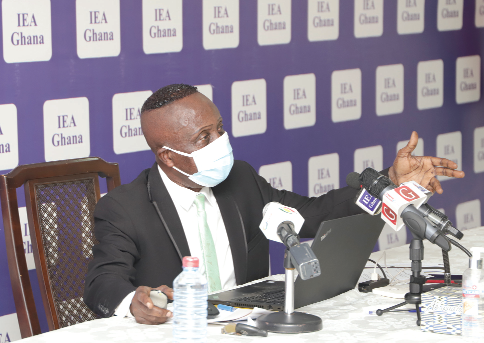- …as study shows 32 of 43 PPAs signed since 2011 still in effect
The nation’s electricity sector is on course for a “crisis of immense financial strain” that requires a more transparent approach in the contracting of Power Purchasing Agreements (PPAs); and transparency with such agreements would be a major step forward in building a low-cost, competitive and sustainable power sector.
This was the principal takeaway from a policy dialogue forum organised by the Institute of Economic Affairs (IEA).
Discussants at the Forum, which had as its theme PPA Transparency can help build Ghana’s Power sector and protect its finances, however differed on the need for a dedicated legal regime to address the subject.
Chairperson of Parliament’s Select Committee on Energy and Mines, Samuel Atta Akyea, argued in favour of a competitive bidding regime for the power sector to ensure “the ultimate beneficiaries of the project has a way to compare elements, so that they will not be short-changed.”
Speaking in support of a standardised legal regime to guide energy sector arrangements, he added that such an approach would safeguard against skewed contracts; and suggested that it would serve as a buffer against disruptions caused by a change of government.
“Any such arrangements must be situated in the context of a legal regime. If we had a legal regime, then you cannot broker deals and skew them toward one person or another as you cannot contract outside, since it would be considered null and void. That is what we need as a nation,” he said.
IPPs have a say
Addressing the subject of excess capacity generation and the cost associated with the so-called take-or-pay model, Chief Executive Officer of the Chamber of Independent Power Producers (IPPs), Elikplim Apetorgbor, explained that current electricity capacity is provided based on the Electricity Company of Ghana’s assessment of future demand – adding that the problem stems from the power distributor’s incapacity to expand its market.
“Power generation procurement is largely informed by the demand for electricity – mostly economic, industrial – and this requires the off-taker as a first step to conduct a study of the demand quantum; not only on the current demand, but also anticipated changes in demand over time,” he said.
The direct negotiation of unsolicited proposals does not engender the level of transparency required, as the provider and off-taker will be clouded by confidentiality clauses, he added.
He tasked stakeholders – government through the Ministry of Energy and its related agencies, as well as players on the electricity value chain – to offer more clarity on arrangements.
“The Public Procurement Authority is expected to provide a clear and transparent structure for power procurement activities in collaboration with the ministries of Energy and Finance… As we speak today, the procurement Authority is not included in the processes leading to the procurement of power plants. They can do more than they are currently doing if we seek more transparency,” he explained.
He further asked that the Energy Commission increases its onsite monitoring, evaluation and audit exercises during the lifecycle of agreements. Offering a possible rationale for the high number of PPAs signed over the past decade, Mr. Apetorgbor stated that they were signed under the policy guidance of making Ghana the sub-region’s electricity hub.
On his part, Deputy Director-General at the Internal Audit Agency, William Offei-Mensah, argued that the existing public procurement framework provides adequate guidance on the subject – the missing element has been dispassionate enforcement of the legal provisions.
Background
An inquiry titled ‘A Case Study of Ghana’s Power Purchase Agreements’, undertaken jointly by the IEA and Energy for Growth Hub, Washington DC, showed that during the 2011-2016 power crisis, ECG committed to 43 PPAs while the Ministry of Energy signed three additional PPAs with EPPs.
It further indicated that Ghana currently has 32 identifiable contracts, or Power Purchase Agreements (PPAs), in force for the provision of electricity generation. Both the Volta River Authority (VRA) and Electricity Company of Ghana (ECG) have PPAs in place with private Independent Power Projects (IPPs).
The Ministry of Energy, the report adds, has also contracted PPAs with Emergency Power Producers (EPPs). Known PPAs for operating or near-operational projects number 14, with a total installed power generation capacity of 2,825 megawatts (MW). Of these, two are solar, three are EPPs and the rest are gas or gas/hybrid IPPs. The remaining 18 PPAs with a further installed capacity of 4,107 MW have been signed but are not yet under construction. Of these, eleven are solar, five gas, one biomass and one sea-wave power. Public information on these contracts is highly limited.
“Several factors make many of these contracts problematic. To date, the country has relied almost entirely on unsolicited proposals to source new energy projects and negotiate PPAs, which limits competition and risks higher prices. In addition, most of these contracts were agreed on a take-or-pay basis; which means that the government of Ghana must pay for the generation capacity even if no electricity is consumed. The only publicly-disclosed aspects of these PPAs are the names of the project, contract type, technology/fuel, location, and total project cost,” the report reads in part.
Most information needed to evaluate project viability or understand the substantial fiscal implications of new power procurement is not available to the public.
Moreover, the accumulation of multiple contracts with undisclosed details also hampers public understanding of the aggregate effects on the cost, stability and sustainability of the broader power system, it adds.
The fiscal burden of these charges pushed government to review the existing PPAs, during which process the Energy Sector Recovery Programme (ESRP) found that, based on demand projections, no additional power generation would be needed until 2027. Following this review, government began an effort to address the sector’s financial crisis by renegotiating or restructuring PPAs for many active or near-operational power projects.










